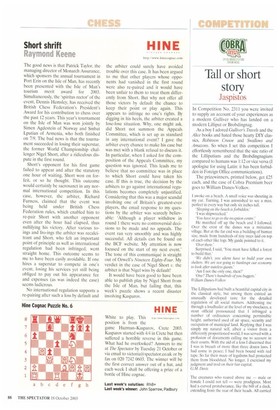Short shrift
The good news is that Patrick Taylor, the managing director of Monarch Assurance, which sponsors the annual tournament in Port Erin on the Isle of Man, has recently been presented with the Isle of Man's tourism merit award for 2003. Simultaneously, the `spiritus rector' of the event, Dennis Hemsley, has received the British Chess Federation's President's Award for his contribution to chess over the past 12 years. This year's tournament on the Isle of Man was won jointly by Simen Agdestein of Norway and Smbat Lputian of Armenia, who both finished on 7/9. The bad news is that the tournament succeeded in losing their superstar, the former World Championship challenger Nigel Short, after a ridiculous dispute in the first round.
Short's opponent for his first game failed to appear and after the statutory one hour of waiting, Short won on forfeit, or so he thought. This outcome would certainly be sacrosanct in any normal international competition. In this case, however, the arbiter, Richard Furness, claimed that the event was being held under British Chess Federation rules, which enabled him to re-pair Short with another opponent even after the hour had elapsed, thus nullifying his victory. After various toings and fro-ings the arbiter was recalcitrant and Short, who felt an important point of principle as well as international regulation had been infringed, went straight home. This outcome seems to me to have been easily avoidable. If one hires a superstar to compete in one's event, losing his services yet still being obliged to pay out his appearance fee and expenses (as was indeed the case) seems ludicrous.
No international regulation supports a re-pairing after such a loss by default and
the arbiter could surely have avoided trouble over this case. It has been argued to me that other players whose opponents had vanished in the first round were also re-paired and it would have been unfair to them to treat them differently from Short. But why not offer all those victors by default the chance to keep their point or play again. This appears to infringe no one's rights. By digging in his heels, the arbiter created a lose-lose situation. Why, one might ask, did Short not summon the Appeals Committee, which is set up as standard in any international event? I gave the arbiter every chance to make his case but was met with a blank refusal to discuss it. In particular, when I asked for the composition of the Appeals Committee, my question was ignored. This leads me to believe that no committee was in place to which Short could have taken his case. If this is true, the decision by the arbiters to go against international regulations becomes completely unjustified. Considering that this was a major scandal involving one of Britain's greatest-ever players, the email response to my questions by the arbiter was scarcely believable: 'Although a player withdrew in round 1 there were no controversial decisions to be made and no appeals. The event ran very smoothly and was highly successful. All details can be found on the BCF website. My attention is now focused on the start of my next event.' The tone of this communiqué is straight out of Orwell's Nineteen Eighty-Four. My verdict in the case of Nigel Short v. the arbiter is that Nigel wins by default!
It would have been good to have been able to publish play by Nigel Short from the Isle of Man, but failing that, this week's puzzle shows a recent disaster involving Kasparov.


































































































 Previous page
Previous page